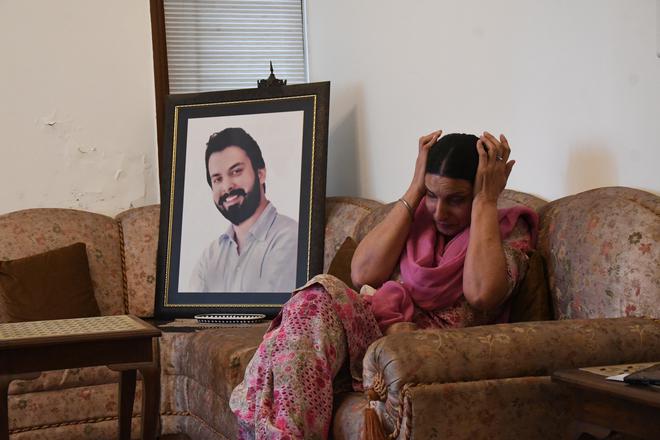
Seated in the living room of her house at Phase 3B2 in Punjab’s Mohali city, 66-year-old Deepinder Kaur often breaks down as she recounts the sequence of events leading up to September 20, 2015 — the fateful night her 34-year-old son Sukhmanpreet Singh Sidhu aka Sippy Sidhu’s pellet-riddled body was found at a park in Chandigarh. Pleading with folded hands, she requests that her son’s killers be quickly brought to book.
Nearly seven years after the murder of the national-level shooter and corporate lawyer that rocked Chandigarh and grabbed the national headlines, the Central Bureau of Investigation (CBI) on June 15 arrested 36-year-old Kalyani Singh — Sippy’s former girlfriend and daughter of Justice Sabina, a judge of the Himachal Pradesh High Court. However, the agency has not yet recovered the murder weapon and the killer’s identity is still shrouded in mystery.
The agency submitted before the Special Judicial Magistrate, CBI court, Chandigarh, that Kalyani and Sippy were in a close relationship and she wanted to marry him. However, her proposal was rejected by his family. According to its submission in court, Sippy had leaked some of her objectionable photographs to her parents and friends, causing embarrassment to her family.
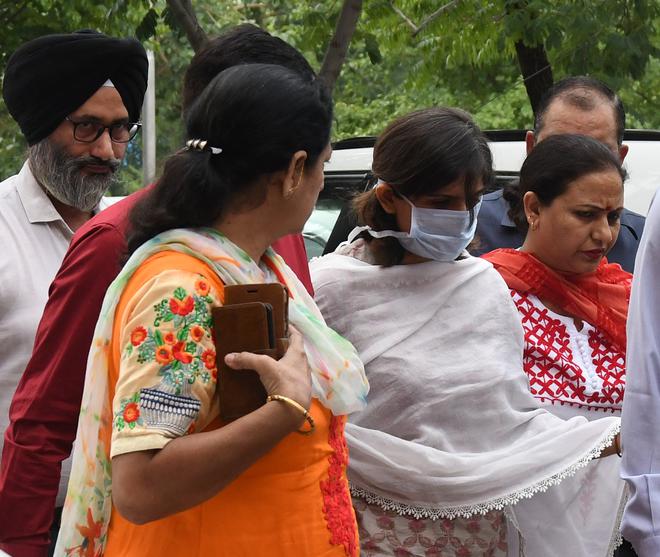
On June 21, following six days of interrogation, Kalyani was produced in a local court, which remanded her in judicial custody for 14 days. The accused was then sent to Model Burail jail in Chandigarh’s Sector 51. According to the CBI, it has gathered sufficient evidence to directly link Kalyani to the murder. Yet, it is faced with the onerous task of proving the charge beyond reasonable doubt in the court of law.
A promising marksman
Sippy was born on December 18, 1980, to Inder Pal Singh Sidhu, an Additional Advocate General of Punjab, and Ms. Kaur, a home-maker. His grandfather, Justice S.S. Sidhu, was a judge of the Punjab and Haryana High Court.
Ms. Kaur said Sippy displayed an active interest in sports right from his school days. “My son won several shooting competitions at the district level and later at the national level. He even set up a shooting range [electronic] on the third floor of our house,” she said.
A rifle shooter, Sippy won the team gold along with Olympic gold medallist Abhinav Bindra in the Punjab National Games in 2001. He was a popular figure on the shooting circuit, winning medals at competitions for over 15 years.
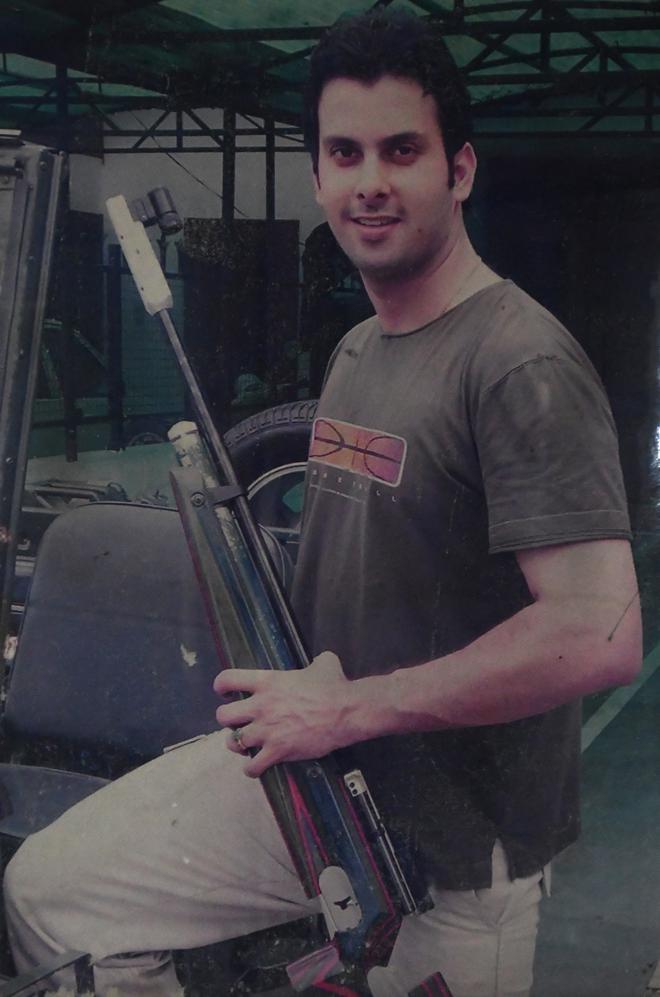
In 2001, Sippy was appointed an Assistant Sub-Inspector in Punjab Police under the sports quota. When he completed his law degree in 2004, he quit the police force. He then registered himself as an advocate with the Bar Council of the Punjab and Haryana High Court and the Supreme Court. Later, he set up Sippy Sidhu Legal, a law firm in Mohali.
“My brother was also the joint secretary of the Paralympic Committee of India and the secretary general of the Paralympic Committee of Punjab,” said Jasmanpreet Singh Sidhu aka Jippy, 37, Sippy’s younger brother.
Jippy said his family once shared close ties with Kalyani’s family. “In 1991, my father and Kalyani’s father were appointed to the post of Assistant Advocate General on the same day. They became good friends over a period of time. Both families used to meet often on the weekends and go on vacations together. While pursuing my graduation in law at Patiala, her mother, then an Additional District and Sessions Judge, would drop me in her car.”

Ms. Kaur said Kalyani frequented their residence to meet Sippy and they soon developed a liking for each other. Shortly after Ms. Kaur’s husband passed away due to a heart attack in December 2008, Kalyani’s parents approached her with a proposal. “From 2010, their family had been expressing an interest in marriage. In 2013, Sabina came to me with a formal proposal. I said I would abide by my son’s wish.”
Relationship sours
According to the CBI, Sippy and Kalyani’s relationship soon turned sour. In October 2014, he allegedly sent objectionable photographs of Kalyani posing with other men to her parents through a person living in the U.K. “Sippy did not tell me anything about the photographs. He did not show any willingness to marry her,” Ms. Kaur said.
The following month, Kalyani and her parents visited Sippy’s house and had a heated exchange with his family. The CBI’s findings show that Kalyani and Sippy remained in touch and she tried to convince him to delete the objectionable photos from his digital devices. She also objected to Sippy’s relations with other women.
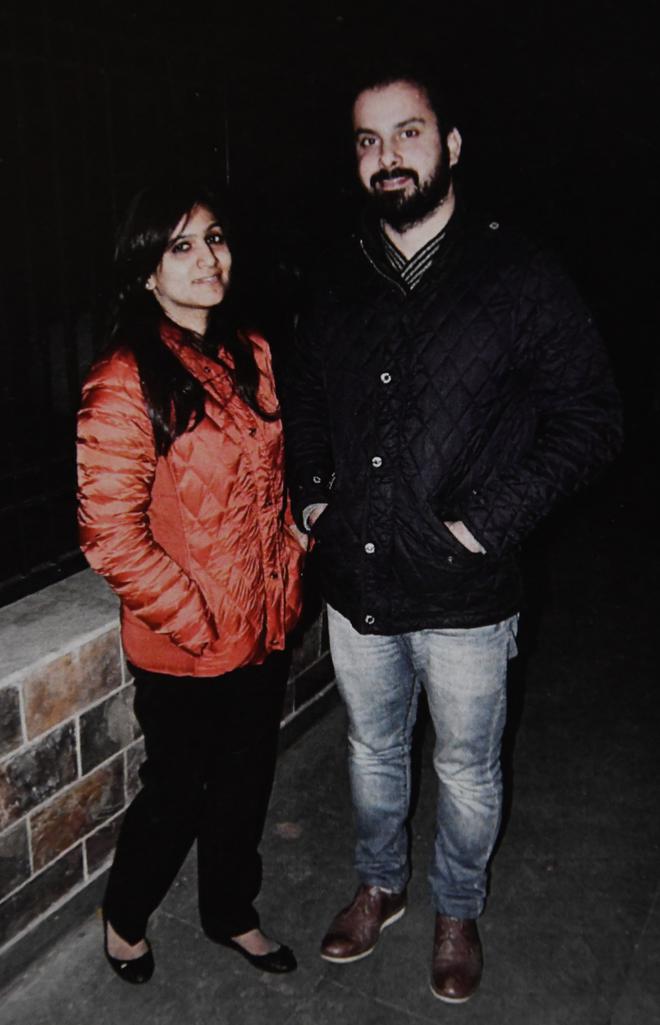
On August 20, 2015, Sippy left for Delhi and stayed the night there. The next day, he boarded a flight to London to meet officials of the British Paralympic Association and check out the facilities at the Stoke Mandeville Stadium, considered the birthplace of the Paralympic movement.
“He then left for Canada to attend a sports awards function,” Jippy said.
Sippy returned to Delhi on September 16, 2015, and stayed with a friend there. On September 18, 2015, he reached Chandigarh. That evening, he left for a park in Sector 27 after receiving calls from two unknown numbers. The CBI later learnt that a young woman had made those calls.
The night of the murder
Ms. Kaur said on September 20, 2015, Sippy left their home around 7.30 p.m. to meet Kalyani at the same park. When he did not return till around 11 p.m., she dialled his phone number. But there was no response. She called him again and this time a woman police officer picked up the phone and informed her that Sippy had met with an accident.
“Shocked, I kept asking her if Sippy was alright and whether Kalyani was safe. Jippy then dropped me at a relative’s house. I went to a gurdwara and prayed for my son’s well-being. Later, I found out that my son had been killed.”
According to the investigators, the police control room received a call late in the evening about a body lying in a pool of blood on the park’s walking track. The then Station House Officer Poonam Dilawri and Assistant Superintendent of Police Guriqbal Singh Sidhu rushed to the spot. The body appeared to have gunshot wounds, but no weapon was recovered from the spot.
Forensic experts inspected the scene of crime and the body was moved to a government hospital, where Jippy identified it as that of his brother. The post-mortem report mentioned four wounds on the body caused by a .12 bore gun.
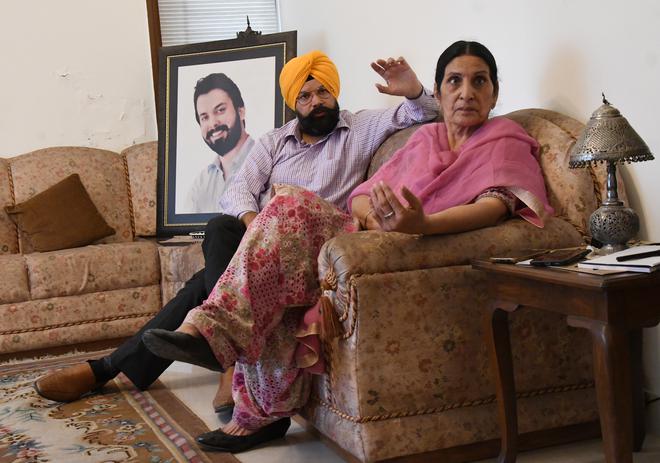
Chandigarh Police then filed an FIR in the case and Ms. Kaur raised suspicions about Kalyani’s complicity in the crime. Justice Sabina was then a judge in the Punjab and Haryana High Court and Sippy’s family accused the police of dragging its feet in the case as they were facing pressure.
On October 10, 2015, the police questioned Kalyani and summoned her later to record her statement. She said at the time of the murder she was at a relative’s birthday party. However, she reportedly did not figure in the photographs taken at the party around the time the murder had been committed.
Seeking justice, Sippy’s family, friends and well-wishers organised several protests and candlelight marches. They also created a Facebook page, Justice For Sippy Sidhu, which is still being updated. On December 24, 2015, Sippy’s relatives held a silent protest near Prime Minister Narendra Modi’s residence in Delhi and were detained by the police for a couple of hours. The following day, they met the then Union Home Minister Rajnath Singh and sought his intervention in the case.
In January 2016, the Chandigarh administration referred the case to the CBI. After Justice Sabina was transferred from the Punjab and Haryana High Court to the Rajasthan High Court on April 7, 2016, the agency’s Special Crime Branch re-registered the FIR on April 13, 2016, and initiated an investigation.
In September 2016, the CBI announced a reward of ₹5 lakh for clues leading to the identities of those involved in the murder. “There is reason to believe that a girl was accompanying the murderer of Sukhmanpreet Singh. The girl is given this opportunity to come forward and contact the below mentioned officers if she is innocent, otherwise it shall be presumed that she was party to the offence,” the agency’s advertisement said.

‘Lapses in investigation’
The CBI probe found alleged lapses on the part of Chandigarh Police that led to destruction of evidence. Crucial footage of the CCTV cameras at the houses facing the park were allegedly not brought on record, which could have helped zero in on the assailant and identify the getaway vehicle. Ms. Kaur said the police also did not obtain the footage of the CCTV camera installed at Sippy’s office.
Sippy’s iPhone was password-protected and became locked due to multiple failed attempts by the police to open it. The agency sent the device to the digital forensics division of the U.S. Federal Bureau of Investigation for retrieving data, including WhatsApp messages, email exchanges and photographs.
In November 2018, the details of the cell phone’s data were received through the Ministry of Home Affairs. The digital content of another iPhone and a laptop found at Sippy’s house was preserved and scrutinised.

Based on the findings, the CBI filed an “untrace report” in a Chandigarh court in December 2020, submitting that the evidence at that stage was not conclusive to prove the charge against Kalyani. The agency sought the court’s approval to keep the case open and continue the probe as there was strong suspicion about her role in the murder. The court then gave the agency its go-ahead. However, since there was no major headway, the reward amount was doubled to ₹10 lakh in December 2021.
On June 15 this year, Kalyani, who was working as an assistant professor in the home science department of the Post Graduate Government College for Girls, Sector 42, Chandigarh, was arrested. She had been under the scanner of the agency for long as it had emerged during the probe that “a woman was accompanying Sippy’s killer”.

Crucial evidence
While seeking Kalyani’s remand, the CBI said it had asked her to undergo a narco-analysis test, but she refused. The agency had earlier conducted a polygraph test, whose report purportedly suggested that her responses were “deceptive” and “evasive” to questions on her “absence” from the party, her “presence” at the park, and Sippy’s murder.
The agency told the CBI court that on September 18, 2015, two days before the murder, Kalyani contacted Sippy through mobile phones of other persons and compelled him to meet her. They then met between September 18 and 20 at the park, the agency said.
The CBI alleged there was evidence confirming her presence with Sippy in the evening on the day of the murder. The probe purportedly revealed that an unknown assailant and Kalyani killed him by using firearms. Thereafter, both of them were seen fleeing the spot, it alleged. The agency said it has seized the accused’s getaway car, however, the identity of the assailant — who fled in another car — still remains a mystery.
On July 4, Kalyani applied for bail before a local court and her plea was posted to be taken up for hearing on July 8. On July 5, the CBI court directed the agency, which is yet to register a formal charge sheet in the case, to file a fresh status report on its investigation within two weeks. The court then adjourned the hearing in the case till July 19.
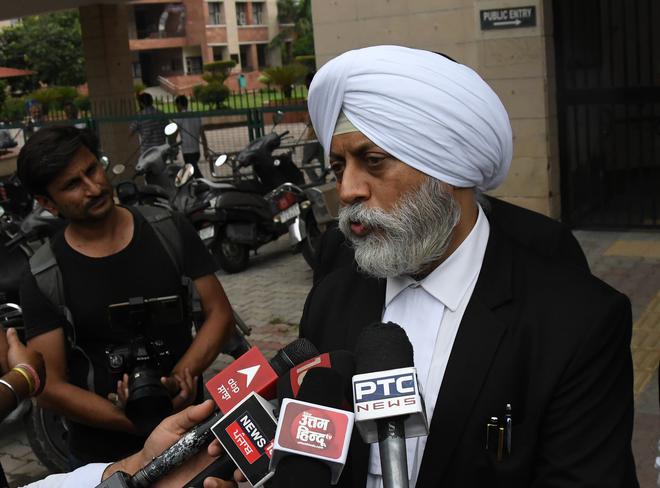
‘Kalyani being made a scapegoat’
Refuting the CBI’s charges, Kalyani’s counsel Sartej Singh Narula said she has been made a scapegoat owing to pressure from Sippy’s family. “Kalyani has been taken to various places [during police custody], including the crime scene and the office of Sippy Sidhu, and interrogated in the presence of a clinical psychologist. She has also been shown to people [in an identification parade] in an attempt by the CBI to create witnesses. This is despite the matter being under investigation for over six years and 178 witnesses having been examined before December 2020,” he said.
Mr. Narula said all close relatives of Kalyani have been summoned, interrogated and questioned at length. “The male relatives, including her father and uncles, were made to walk and run from the crime scene to the place where the car, in which the assailants are stated to have fled, was parked. They were made to sit in a parked car for crime mapping with the help of CCTV footage and to verify if any of them could be suspects. The mapping has, however, proved that none of the male relatives was at the scene of crime,” he said.
The mobile tower location of the cell phones of Kalyani or any other relative has not been traced to the murder spot, Mr. Narula said.

He alleged that the other key angle that has not been investigated is whether any of Sippy’s six other “girlfriends” mentioned in the list of witnesses in the “untrace report” had been “blackmailed by him” or if he possessed their obscene photographs. “All these girlfriends have been arrayed as witnesses but their presence at the time of occurrence [of the murder], and their call data records have not been analysed. The reason why Kalyani Singh is being revisited time and again can only be disclosed by the CBI,” he said.
Mr. Narula added that Sippy had been involved in making property deals and investments for politicians and other influential people. “It is a clear case of contract killing. He was shot four times in quick succession with country-made .12 bore pistols from close range. This angle of him having disputes with someone who made investments through him also cannot be ruled out.”
The lawyer alleged that it was apparent from Sippy’s emails that he had made “big money by fooling people and became a millionaire” after starting with just ₹20,000 in 2008, when he lost his father.
Refuting allegations
Countering the allegations, Jippy said his family’s primary source of income was from the agricultural and urban properties that it owned. He said apart from Kalyani, Sippy had relations with only one other woman. It is learnt that the CBI had earlier looked into the property angle, but found no evidence. During the probe, the agency examined Sippy’s relations with other female friends and recorded their statements.
However, it did not find anything that linked them to the murder and ruled out their involvement in the crime.
On June 21, when the CBI produced Kalyani in a local court on completion of her police custody, Ms. Kaur, Jippy and a few relatives arrived to witness the proceedings. “The CBI has shown courage in making the arrest. We are now hopeful of receiving justice. I have full faith in the judiciary,” Ms. Kaur said.







